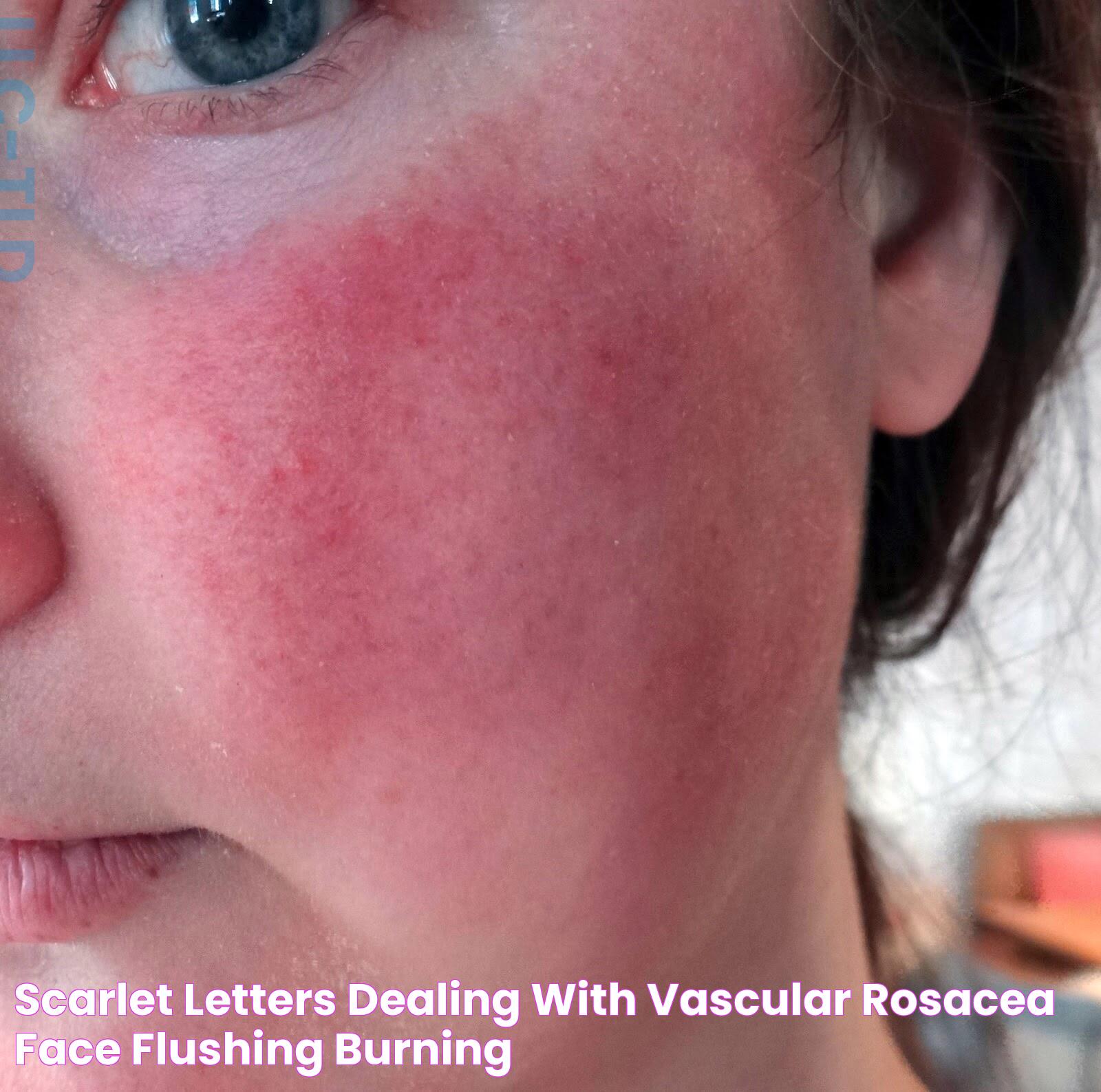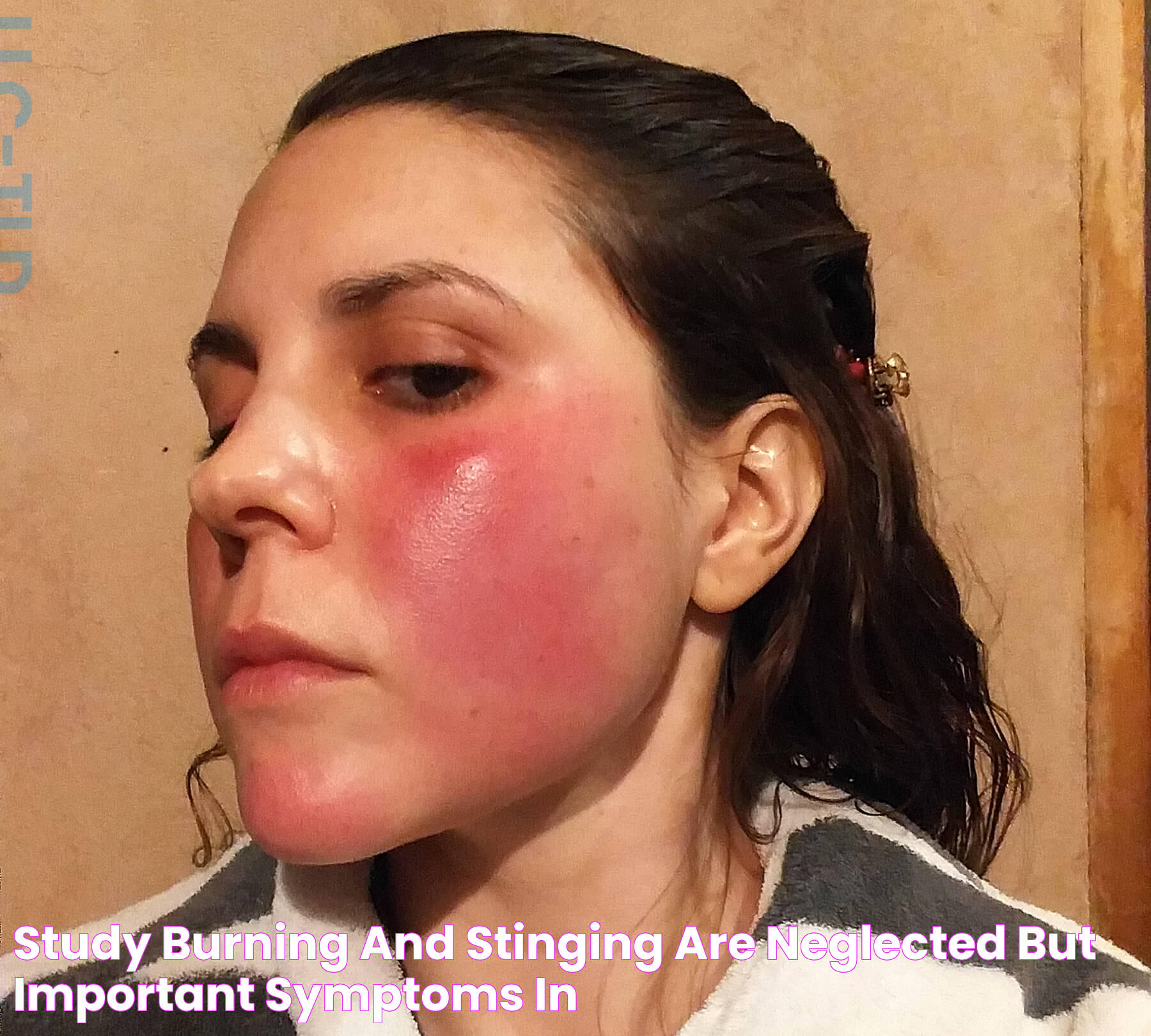The phenomenon of skin suddenly turning red and burning on the face is not only alarming but can leave individuals feeling uncomfortable and concerned about their appearance. This unexpected reaction can occur without warning, and understanding its underlying causes is crucial for effective management. Whether it’s a fleeting sensation or a persistent issue, knowing what triggers this condition can aid in finding the right treatment and advice.
Skin issues can have various origins, ranging from environmental factors to underlying health conditions. When you experience your skin suddenly becoming red and burning on your face, it can lead to a cascade of emotional and physical responses. While some might dismiss it as a temporary annoyance, for others, it can significantly impact their quality of life. This article aims to delve into the intricacies of this condition, offering insights into potential triggers and effective remedies.
As we explore this topic further, we will cover a wide array of factors contributing to this skin condition. From allergies to lifestyle choices, each plays a pivotal role in how our skin reacts. By understanding these factors, individuals can better prepare and protect their skin, ensuring it remains healthy and resilient. With expert insights and practical advice, this guide will serve as a comprehensive resource for anyone seeking to alleviate the discomfort associated with skin suddenly turning red and burning on the face.
Read also:Aloe Vera For Radiant Skin Facial Aloe Smoothing Benefits And Techniques
Table of Contents
- What Causes Skin Redness and Burning on the Face?
- Can Allergies Cause Skin Issues?
- How Do Environmental Factors Affect Skin?
- Are Your Skincare Products the Culprits?
- Understanding the Role of Stress
- Dietary Influences on Skin Health
- Can Health Conditions Trigger Skin Reactions?
- How to Identify the Triggers?
- Effective Home Remedies
- When to See a Dermatologist?
- Tips for Preventing Skin Redness and Burning
- Frequently Asked Questions
- Conclusion
What Causes Skin Redness and Burning on the Face?
Experiencing skin suddenly red and burning on the face can be a perplexing situation for many. The causes are varied and can be attributed to both external and internal factors. One of the most common reasons is a reaction to skincare products or cosmetics, which may contain ingredients that irritate sensitive skin. Such reactions can lead to immediate redness and a burning sensation.
Another significant factor is exposure to harsh environmental conditions such as extreme temperatures, wind, or pollution. These elements can strip the skin of its natural moisture barrier, leading to increased sensitivity and irritation. Additionally, sun exposure without adequate protection can cause sunburn, which is characterized by redness and a burning sensation.
Moreover, lifestyle choices such as diet and stress levels play a crucial role in skin health. Consuming spicy foods, alcohol, or caffeine can dilate blood vessels, leading to flushing and redness. Stress, on the other hand, triggers the release of cortisol, which can exacerbate skin inflammation and sensitivity.
Can Allergies Cause Skin Issues?
Yes, allergies are a common cause of skin suddenly red and burning on the face. Allergic reactions can occur due to exposure to allergens such as pollen, dust mites, pet dander, or certain foods. These allergens can trigger the immune system to release histamines, leading to inflammation, redness, and itching.
Contact dermatitis is another allergy-related condition where the skin reacts to substances it comes into contact with. This could be due to ingredients in skincare products, fragrances, or metals. Identifying and avoiding these allergens is crucial in managing allergic skin reactions.
Furthermore, seasonal allergies can exacerbate existing skin conditions such as eczema or rosacea, leading to increased redness and irritation. Over-the-counter antihistamines or prescription medications can help alleviate these symptoms.
Read also:Long Hair With White Streak Before2022 Style And Significance
How Do Environmental Factors Affect Skin?
Environmental factors significantly impact skin health, often leading to conditions where the skin becomes suddenly red and burning on the face. Pollution, for instance, is known to introduce free radicals that damage skin cells, resulting in inflammation and irritation. Smog and other pollutants can clog pores and lead to breakouts, which can be accompanied by redness and a burning sensation.
Climate plays a pivotal role as well. Cold weather can deplete the skin's moisture, leading to dryness and increased sensitivity. Conversely, hot and humid conditions can cause excessive sweating, which may irritate the skin. Wind exposure can also strip the skin of its natural oils, making it more prone to redness and irritation.
To combat these effects, it's essential to protect the skin with appropriate skincare products that provide a barrier against environmental aggressors. Using products with antioxidants can help neutralize free radicals, while moisturizers can maintain skin hydration and resilience.
Are Your Skincare Products the Culprits?
Skincare products, although designed to enhance skin health, can sometimes be the culprits behind skin suddenly red and burning on the face. This typically occurs when a product contains harsh or allergenic ingredients that are not compatible with an individual's skin type. Ingredients like alcohol, fragrances, and certain preservatives can be particularly irritating to sensitive skin.
Moreover, using too many active ingredients simultaneously, such as retinoids, acids, or exfoliants, can compromise the skin's barrier, leading to increased sensitivity and irritation. It's essential to introduce new products gradually and perform patch tests to ensure compatibility with your skin.
Additionally, expired products or those that have been improperly stored can degrade and cause adverse reactions. Regularly checking expiration dates and storing products in a cool, dry place can prevent potential skin issues.
Understanding the Role of Stress
Stress is an often underestimated factor that can lead to skin suddenly red and burning on the face. When the body undergoes stress, it releases hormones like cortisol and adrenaline, which can trigger inflammation and exacerbate skin conditions such as acne, eczema, or rosacea.
Chronic stress can weaken the skin's protective barrier, making it more susceptible to environmental damage and irritation. It can also impair the skin's ability to retain moisture, leading to dryness and increased sensitivity.
Managing stress through techniques such as mindfulness, yoga, or regular exercise can have a positive impact on skin health. Ensuring adequate sleep, maintaining a balanced diet, and seeking professional help if necessary are also important steps in managing stress-related skin issues.
Dietary Influences on Skin Health
The role of diet in skin health is undeniable, and certain foods can lead to skin suddenly red and burning on the face. Consuming foods high in sugar, refined carbohydrates, or unhealthy fats can trigger inflammation and aggravate skin conditions like acne and rosacea.
Conversely, a diet rich in antioxidants, omega-3 fatty acids, and vitamins can promote skin health and reduce inflammation. Foods like fruits, vegetables, nuts, and fish are excellent choices for maintaining a healthy complexion.
Hydration is equally crucial, as water helps flush out toxins and keep the skin hydrated. Limiting alcohol and caffeine intake can also prevent dehydration and its associated skin issues.
Can Health Conditions Trigger Skin Reactions?
Indeed, underlying health conditions can be a significant cause of skin suddenly red and burning on the face. Autoimmune disorders like lupus or psoriasis can lead to skin inflammation and increased sensitivity. Conditions such as thyroid disorders or diabetes can also affect skin health, leading to dryness or increased susceptibility to irritation.
Rosacea, a chronic skin condition, is characterized by facial redness and can be triggered by various factors, including heat, spicy foods, or stress. Identifying and managing these triggers is crucial in controlling the condition.
Consulting a healthcare professional for a proper diagnosis and treatment plan is essential if an underlying health condition is suspected. Managing the primary condition can often alleviate associated skin symptoms.
How to Identify the Triggers?
Identifying triggers for skin suddenly red and burning on the face requires a systematic approach. Keeping a skin diary can help track occurrences and identify potential triggers, such as specific foods, skincare products, or environmental factors.
Patch testing new skincare products before full application can help identify potential allergens or irritants. Additionally, eliminating suspected triggers one at a time and observing skin reactions can aid in pinpointing the cause of irritation.
Consulting with a dermatologist can provide further insights and help develop a tailored skincare routine to minimize triggers and manage symptoms effectively.
Effective Home Remedies
Several home remedies can alleviate skin suddenly red and burning on the face. Cold compresses or aloe vera gel can provide immediate relief by soothing inflamed skin and reducing redness. Oatmeal baths or masks are also effective due to their anti-inflammatory properties.
Applying green tea or chamomile tea compresses can also help calm irritated skin. These natural remedies have antioxidant properties that can reduce inflammation and promote healing.
It's important to perform a patch test before trying new home remedies to ensure they do not exacerbate the condition. Additionally, maintaining a gentle skincare routine with mild, fragrance-free products can support skin recovery.
When to See a Dermatologist?
If skin suddenly red and burning on the face persists despite home care and lifestyle adjustments, it may be time to consult a dermatologist. Persistent or severe symptoms could indicate an underlying condition that requires professional evaluation and treatment.
A dermatologist can perform tests to identify allergens or other triggers and recommend appropriate treatments, such as topical medications or oral antihistamines. They can also provide guidance on developing a skincare routine tailored to individual needs.
Early intervention can prevent further skin damage and improve overall skin health, making professional consultation a valuable step in managing persistent skin issues.
Tips for Preventing Skin Redness and Burning
Preventive measures are key in managing skin suddenly red and burning on the face. Protecting the skin from environmental aggressors with sunscreen and appropriate clothing can prevent irritation and sunburn. Using gentle, hypoallergenic skincare products can also minimize the risk of adverse reactions.
Maintaining a healthy lifestyle by managing stress, following a balanced diet, and staying hydrated can support skin health and resilience. Regularly reviewing skincare routines and avoiding known triggers are also essential steps in prevention.
Consistency is crucial, and small daily habits can make a significant difference in maintaining skin health and preventing sudden redness and burning sensations.
Frequently Asked Questions
1. Can certain medications cause skin redness and burning?
Yes, some medications can cause skin reactions as a side effect. It's important to consult a healthcare provider if you suspect a medication is causing skin issues.
2. Is skin redness and burning a sign of an allergic reaction?
It can be. Allergic reactions often cause redness and a burning sensation, along with other symptoms such as itching or swelling.
3. Can dehydration lead to skin redness and burning?
Dehydration can lead to dry skin, which may become more sensitive and prone to irritation, potentially causing redness and burning sensations.
4. Are natural remedies effective for treating skin redness and burning?
Natural remedies can be effective for mild cases. However, it's important to ensure they don't cause further irritation and are used appropriately.
5. How long does it take for skin redness and burning to subside?
The duration can vary depending on the cause. Mild cases may resolve within a few hours to days, while chronic conditions may require ongoing management.
6. Can skin redness and burning be prevented with lifestyle changes?
Yes, lifestyle changes such as managing stress, maintaining a healthy diet, and using appropriate skincare products can help prevent skin issues.
Conclusion
In summary, skin suddenly red and burning on the face is a complex issue with numerous potential causes and solutions. Understanding the underlying triggers, whether environmental, allergic, or health-related, is crucial for effective management. By adopting preventive measures and consulting professionals when necessary, individuals can achieve and maintain healthier skin.
For further reading and expert advice, consider visiting reputable dermatology websites or consulting with a certified dermatologist.

